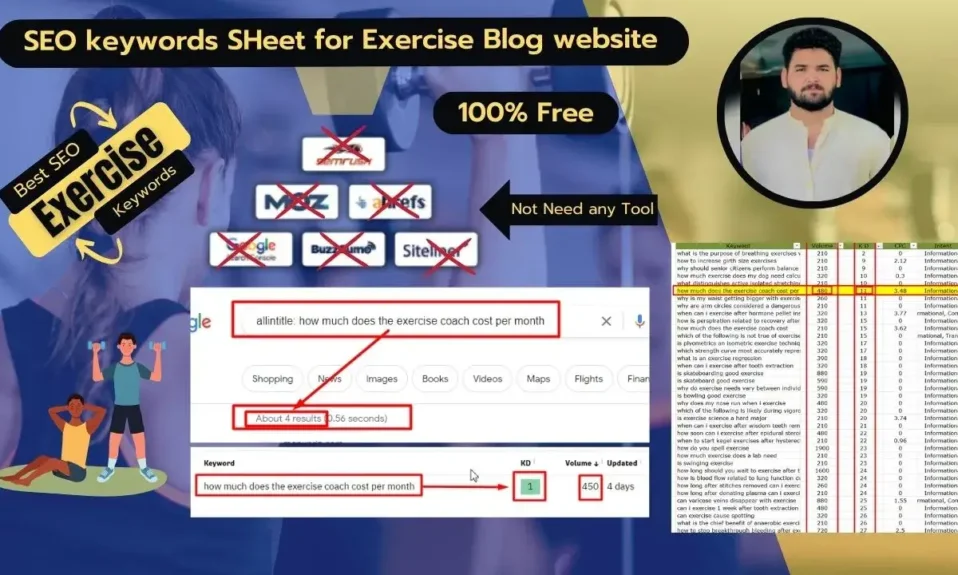
Keyword research is a critical aspect of food blogging, and its significance cannot be overstated. As a food blogger, understanding how the right keywords can boost your cooking website’s SEO is paramount to driving organic traffic and engaging with your audience effectively. In this article, we will delve into the world of cooking keywords, providing you with a comprehensive primer to master this essential element of your blogging journey.
Section 1: The Basics of Keyword Research
What Are Keywords and Why Are They Important?
Keywords are words or phrases that users enter into search engines to find information they are looking for. In the context of food blogging, keywords represent the queries people make when searching for recipes, cooking tips, or culinary information. By incorporating relevant keywords strategically into your content, you can significantly improve the chances of your cooking website appearing in search engine results, ultimately driving more traffic to your blog.
Types of Keywords:
Short-tail vs. Long-tail Keywords
Short-tail keywords consist of one or two words and are often more generic. They have high search volume but can also be highly competitive. On the other hand, long-tail keywords are longer phrases that are more specific and have lower search volume but are often easier to rank for. As a food blogger, striking the right balance between short-tail and long-tail keywords is crucial for maximizing your website’s visibility and attracting the right audience.
Keyword Intent:
Navigational, Informational, Transactional
Understanding the intent behind keywords is vital in creating relevant content. Navigational intent refers to queries where users are looking for a specific website or brand. Informational intent involves users seeking answers to questions or information on a topic. Transactional intent signifies users searching with the intention of making a purchase or taking a specific action. Tailoring your content to match the intent of the keywords used by your target audience can lead to higher engagement and conversions.
Top Tools for Keyword Research:
Google Keyword Planner, SEMrush, Ahrefs, etc.
To conduct effective keyword research, you can leverage various keyword research tools available in the market. Google Keyword Planner is a popular free tool that provides valuable insights into keyword search volume and competition. SEMrush and Ahrefs are more advanced paid tools that offer in-depth competitor analysis, keyword difficulty metrics, and extensive keyword suggestions. Utilizing these tools will enable you to discover relevant and high-performing keywords for your food blog.
Section 2: Keyword Research for Cooking Websites
Brainstorming Relevant Topics and Themes Start your keyword research journey by brainstorming relevant topics and themes that align with your food blog’s niche. Think about the types of recipes, cuisines, and cooking techniques you specialize in. Consider the preferences and interests of your target audience and how you can cater to their needs through your content.
Identifying Seed Keywords for Your Niche Seed keywords are the foundation of your keyword research. These are basic, broad keywords that directly relate to your niche. For a food blogger, seed keywords could include terms like “recipes,” “cooking tips,” or “food photography.” Once you have identified your seed keywords, you can expand your keyword list further.
Expanding Your List with Synonyms and Related Terms To broaden your keyword list, explore synonyms and related terms for your seed keywords. Tools like Thesaurus or keyword research platforms can assist you in finding variations of your seed keywords. This step will help you uncover more diverse keyword options and capture a wider range of audience searches.
Section 3: Free SEO Keywords for Cooking Websites
Leveraging Google’s “People Also Ask” and “Searches Related To” Features Google’s “People Also Ask” and “Searches Related To” features can be a goldmine for free SEO keywords. When you search for a keyword on Google, these sections display related questions and search queries that users commonly make. By incorporating these questions and queries into your content, you can address the specific needs and interests of your audience.
Utilizing Google Trends for Seasonal and Trending Keywords Google Trends is an invaluable tool to identify seasonal and trending keywords. It allows you to observe the popularity of specific keywords over time, providing insights into the seasonality of different recipes and cooking trends. By creating content around trending keywords, you can capitalize on the heightened interest and generate more traffic during peak periods.
Mining Quora and Reddit for User-Generated Keywords Quora and Reddit are vibrant communities where people ask questions and share knowledge. These platforms can be an excellent resource for discovering user-generated keywords and understanding the questions and challenges faced by your audience. By participating in these communities and addressing their queries through your blog, you can establish yourself as an authoritative figure in the food blogging sphere.
Section 4: SEO Keyword Research for Cooking Websites
Understanding Search Volume and Competition Metrics When conducting keyword research, it’s essential to consider the search volume and competition metrics for each keyword. High search volume indicates a significant number of people searching for that keyword, but it also means higher competition. On the other hand, low competition keywords may be easier to rank for but might have limited search volume. Balancing these factors will help you target keywords that have a reasonable chance of ranking well while driving meaningful traffic.
Choosing the Right Keywords Based on Difficulty and Relevance Not all keywords are created equal. Some keywords may be highly competitive, making it challenging to rank for them, while others may not be directly relevant to your niche. It’s essential to strike a balance by selecting keywords that are both relevant to your content and have a manageable level of competition. Focus on keywords that align with your food blog’s mission and can attract your target audience effectively.
Long-tail Keywords: The Secret Sauce for Niche Traffic Long-tail keywords can be the secret sauce for driving niche traffic to your cooking website. These specific phrases cater to users looking for highly specific information or products. By optimizing your content for long-tail keywords, you can attract a more targeted audience and increase the chances of conversions.
Section 5: Best SEO Keywords for Cooking Websites
Analyzing Competitors and Identifying High-Performing Keywords Analyzing your competitors’ strategies can provide valuable insights into high-performing keywords. Identify your main competitors in the food blogging space and assess the keywords they are ranking for. Tools like SEMrush and Ahrefs can help you uncover your competitors’ top keywords, enabling you to refine your own keyword strategy.
Using Google Analytics to Discover Top-performing Keywords Google Analytics is an indispensable tool for tracking the performance of your website and understanding user behavior. By analyzing the keywords that are driving the most traffic and conversions, you can identify your top-performing keywords and optimize your content to further capitalize on their success.
Incorporating Branded Keywords for Your Cooking Website Branded keywords are keywords that include your blog’s name or brand. Incorporating branded keywords into your content is essential for enhancing brand visibility and establishing a strong online presence. Users who specifically search for your brand are already interested in your content, making them valuable potential customers.
Section 6: Asian Fusion Cooking Explained
What is Asian Fusion Cuisine and Its Popularity Asian Fusion cuisine is a culinary trend that combines elements from various Asian cultures to create innovative and unique dishes. This fusion of flavors and cooking techniques has gained immense popularity globally. Exploring the nuances of Asian Fusion cuisine and how it appeals to diverse palates will provide your audience with a deeper appreciation for this culinary art form.
Key Ingredients and Techniques in Asian Fusion Cooking Delve into the key ingredients and techniques that define Asian Fusion cooking. From traditional Asian herbs and spices to modern cooking methods, there’s a wide range of elements that contribute to the exquisite flavors and textures found in Asian Fusion dishes. Highlighting specific ingredients and cooking techniques will allow your readers to gain a better understanding of how to incorporate these flavors into their own culinary creations.
Section 7: Keyword Optimization for Food Blog Posts
On-Page SEO: Optimizing Titles, Headings, and Meta Descriptions On-page SEO is the practice of optimizing individual web pages to improve their search engine rankings and attract organic traffic. Pay close attention to your blog post titles, headings, and meta descriptions, ensuring they contain relevant keywords. Craft compelling and informative titles that entice readers while accurately representing the content. Well-structured headings make your blog posts more scannable and accessible. Additionally, crafting concise yet informative meta descriptions can significantly impact click-through rates from search engine results.
Using daily Keywords Update Naturally in Your Blog Content Keyword stuffing, or excessively using keywords in your content, can be detrimental to your blog’s SEO and readability. Instead, focus on using keywords naturally and contextually within your blog posts. Create valuable and engaging content that seamlessly integrates relevant keywords, providing your readers with valuable information and a pleasant reading experience.
Image SEO: Alt Text and Image File Names Optimizing your images for SEO is often overlooked but can yield significant benefits. When adding images to your blog posts, use descriptive and keyword-rich alt text to provide context to search engines. Additionally, rename image files to include relevant keywords before uploading them to your website. This practice improves image search visibility and enhances your overall SEO efforts.
Section 8: SEO-Friendly Recipe Formatting
Organizing Recipes with Keyword-Rich Titles and Subtitles When presenting recipes on your food blog, employ SEO-friendly formatting to optimize for search engines. Create clear and keyword-rich recipe titles and subtitles. Be specific about the type of cuisine or dish, and consider including relevant descriptors such as “easy,” “healthy,” or “gluten-free” to appeal to specific audiences. A well-structured recipe format not only improves SEO but also enhances the user experience for your readers.
Utilizing Structured Data Markup for Enhanced Visibility Structured data markup, also known as schema markup, provides search engines with additional context about your content. Implementing schema markup for your recipes can result in rich snippets appearing in search engine results. Rich snippets, such as star ratings, cooking times, and calorie information, can make your content stand out and attract more clicks from users.
Adding Relevant Keywords to Recipe Card Plugins If you utilize recipe card plugins on your cooking website, take advantage of the opportunity to include relevant keywords in the plugin settings. These plugins often allow you to add additional information such as cooking instructions, ingredient lists, and nutrition facts. By strategically incorporating keywords in these sections, you can further optimize your recipes for search engine visibility.
Section 9: The Impact of Voice Search on Cooking Keywords
Rise of Voice Assistants and Voice-Activated Devices With the rise of voice assistants like Siri, Alexa, and Google Assistant, voice search is becoming increasingly prevalent. Users now prefer the convenience of voice-activated devices to perform searches, including recipe inquiries. Understanding the impact of voice search on cooking keywords is crucial for adapting your content to cater to this growing user behavior.
Optimizing Content for Voice Search Queries Voice search queries often differ from traditional typed searches. Users tend to use more conversational language when using voice assistants. To optimize your content for voice search, consider incorporating natural language and long-tail keywords that reflect how people speak and ask questions in everyday conversations.
Section 10: Tracking and Measuring Keyword Performance
Setting Up Google Search Console for Keyword Insights Google Search Console is a valuable tool for monitoring your website’s performance in Google search results. It provides essential keyword insights, including the keywords your website is ranking for, their average position, and the click-through rates. Utilize this data to identify opportunities for improvement and track the progress of your keyword optimization efforts.
Measuring Keyword Success with Click-Through Rates (CTR) and Conversion Rates Analyzing click-through rates (CTR) and conversion rates associated with specific keywords can offer valuable performance metrics. A high CTR indicates that users find your content relevant and enticing, while a high conversion rate demonstrates that your content successfully drives users to take action, such as signing up for a newsletter or making a purchase. Use this data to fine-tune your keyword strategy and focus on the keywords that yield the best results.
Adjusting Your Keyword Strategy Based on Performance Metrics Keyword research and optimization are not one-time tasks but ongoing processes. Continuously monitor your keyword performance metrics and be prepared to adjust your strategy accordingly. If certain keywords are underperforming, consider revisiting your content and optimizing it further. Conversely, if specific keywords are generating exceptional results, find ways to expand upon and capitalize on their success.
Section 11: Long-Term Keyword Strategy for Sustainable Growth
The Importance of Regular Keyword Updates and Refreshes As search trends and user preferences evolve, it’s essential to keep your keyword strategy up to date. Regularly review and update your keyword list to ensure that it remains relevant to your audience’s interests and current search behavior. By staying ahead of the curve, you can maintain or improve your website’s search engine rankings and attract sustained traffic.
Analyzing Keyword Trends to Stay Ahead of the Competition Keyword trends are constantly changing, and keeping a close eye on emerging trends can provide a competitive advantage. Use tools like Google Trends and industry-specific publications to identify new keywords that are gaining popularity. By incorporating these trending keywords into your content, you can position your cooking website as a reliable source of the latest culinary information.
Adapting Your Content Strategy to Evolving Keyword Demands Your content strategy should be flexible and adaptable to accommodate changes in keyword demands and user preferences. As you discover new keywords and analyze performance data, adjust your content plan to include topics and themes that align with the evolving needs of your audience. This adaptive approach will help you maintain relevance and continue attracting engaged readers.
Conclusion:
The power of cooking keywords in driving traffic and engagement for your food blog cannot be underestimated. By mastering the art of keyword research and optimization, you can unlock the potential to reach a wider audience, improve your website’s search engine rankings, and establish your cooking website as a trusted resource in the culinary world. Stay diligent in your keyword research efforts, adapt to emerging trends, and consistently provide valuable content to enjoy sustained growth and success in the competitive landscape of food blogging. Remember, the right keywords are the secret ingredients that will elevate your cooking website to new heights of online visibility and audience appreciation. Happy blogging!










3 Comments